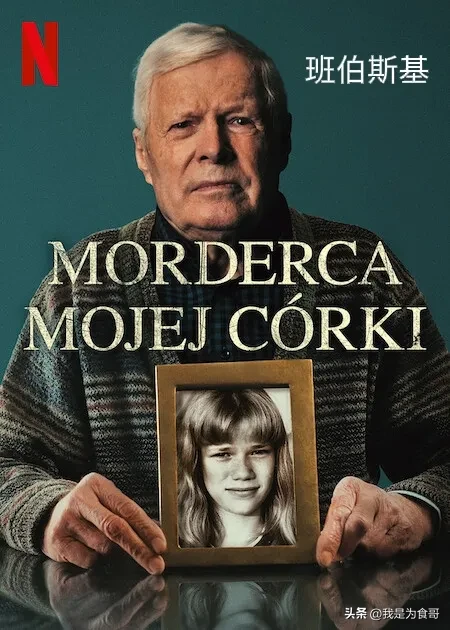A father has been on the run for 30 years to bring his daughter's killer to justice. It also led to a protracted legal war between France and Germany. This father's indomitable and never-say-die spirit has touched millions of people.
André Banbosski was born in France in 1938. In the early 1970s, he and his wife Danielle Gunning, along with their daughter Kalinka Banberski and son Nicholas Banbersky, moved to Casablanca, Morocco. There, they met Dieter Kronbach (b. 1935), who was working as a doctor at the German consulate, and his second wife.
Soon, Kronbach and Gunning began their secret affair, and eventually they divorced, the two married in 1977, and Banberski's two children eventually went with their mother to kronbach's house in Lindau, Germany.
On the morning of July 10, 1982, Kalinka was found dead in bed in her room by Kronbach. Her biological father, Banbersky, then went to Germany for her funeral and did not suspect anything.
Three months later, Banbersky received a translation of his daughter's autopsy report. It was learned from the report that Dr. Hohmann, the local prosecutor and Kronbach were involved in the autopsy proceedings.
At first, he was puzzled by Kronbach's (not shying away) appearance in the autopsy of his own stepdaughter, but was soon shocked by reports: Homan found blood on Kalinka's vagina and a "viscous white liquid" inside, and Kalinka's right upper arm had a new puncture mark, caused by an intravenous kobalt-Ferrlecit, a controversial iron supplement.
In the report, Kronbach admitted that the injections were given to help her tan on Friday night (Kronbach later changed his tune, saying it was to treat her anemia). Horman did not perform toxicological tests on blood or tissue, nor did it determine whether Kalinka was a virgin, and the report declared the cause of death "unknown."
When he finished reading the report, he was filled with question marks. What did Kronbach do during the autopsy? Why didn't he mention anything about injections before? At this moment, his heart was like a knife, and he felt sorry for his daughter.
It turned out that Gunning had divorced him, and she had ceded custody to Banbersky, leaving the two children in France. But in 1980, Banberski decided to return to Morocco with his children. Gunning did not allow his children to go to Morocco, and Banberski eventually relinquished custody. If her daughter had been with her, she would not have died for no reason! It was this remorse that prompted him to work harder to find the truth of her death.
Banbersky suspected that Kronbach had raped Kalinka and then exterminated him by injection.
Under pressure from Banbersky's lawyers, German authorities reopened the investigation, and in February and March 1983, Wolfgang Spann, a forensic doctor in Munich, studied tissue samples. As a result, official doubts have been raised for Kronbach's claims. Span accused Kronbach of using a "dangerous" substance that is useless for tanning.
He reported the presence of food particles in Kalinka's lungs and esophagus, and after receiving the injection, she lost consciousness and vomit entered the respiratory tract causing choking. Span's determination that Kronbach misled authorities about the timing of the injection and Kalinka's death, and that her death "occurred almost immediately [at the time of the injection].
A few days later, German authorities halted the investigation into Kalinka's death.
Banbersky then distributed leaflets in Lindau accusing Kronbach of raping and murdering his daughter. The police quickly arrested him, accusing him of defamation of Kerenbach, disturbing public order and damaging the reputation of prosecutors, and he returned to France by paying a deposit. Banberski was then sentenced in absentia to 6 months in prison or a fine of 400,000 Deutsche Marks.
After being disappointed with the German authorities, Banberski turned his attention to France, as Kalinka was a French citizen.
In 1985, French authorities exhumed Kalinka's body from her grave. The excavation revealed a disturbing fact: her private parts had been completely cut off and disappeared during the autopsy. The disappearances heightenEd Banberski's suspicions that German authorities were favoring Kronbach.
In 1988, at the request of French prosecutors, German authorities sent lung, heart, skin and other samples taken from Kalinka to the Institute of Legal Medicine in Paris (and the test tube filled with her blood, which Span inexplicably discarded).
Three French pathologists came to a conclusion. Suffocation and death occurred "almost instantaneously" after receiving an injection in her right arm, and the findings were enough to persuade the French judiciary to find Clenbach guilty.
In 1989, Gunning divorced Kronbach and returned to France, but she still claimed that Kronbach was innocent.
On April 8, 1993, attorney general charged Kronbach with "intentional homicide" and asked German authorities to arrest him, but Germany refused.
On March 9, 1995, Kronbach was convicted of murder in absentia at a court in Paris and sentenced to 15 years in prison. However, the German authorities did not recognize the verdict.
On the afternoon of February 11, 1997, a 16-year-old girl named Laura Steyr was given an intravenous anesthetic by him at the Kronbach Clinic and raped her. Six months later, a German judge convicted Kronbach of raping a minor, revoked his medical license, and sentenced him to two years in prison. However, because of his criminal record in Germany and his prestige in the community, he was sentenced to a suspended sentence.
In 1999, Banbersky quit his job and devoted himself to the hunt for Kronbach. He visited the gendarmerie, police stations and customs posts in Austria and Switzerland and distributed photographs of Kronbach, newspaper clippings and judicial orders of French courts.
In 2000, an Austrian police officer arrested Kronbach, and an Austrian judge subsequently found the trial "unlawful in France" and ordered his release.
Sorry, due to the number of words, please pay attention to the top comments for the ending.
